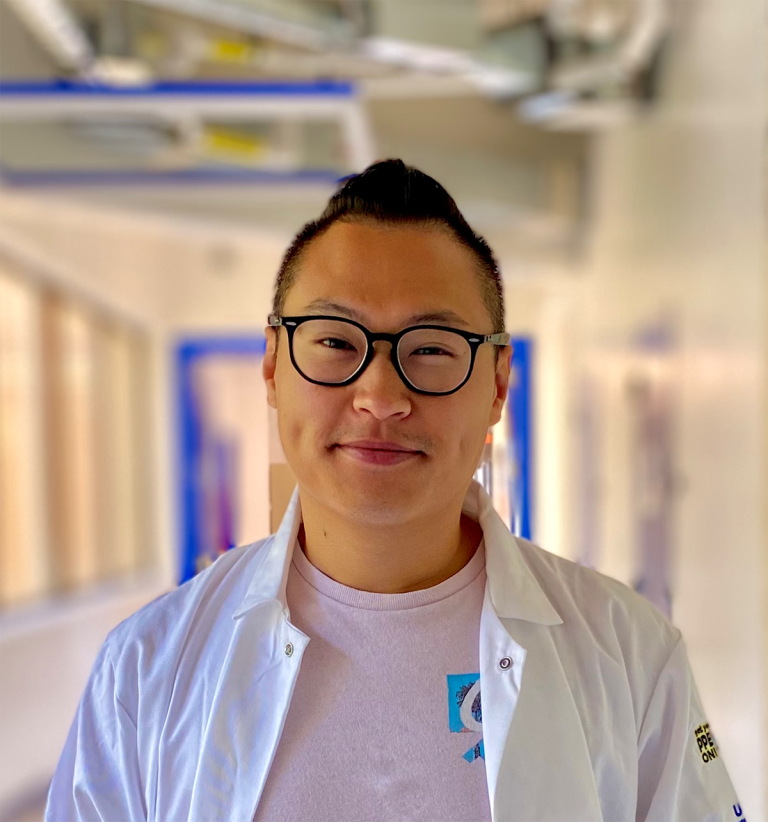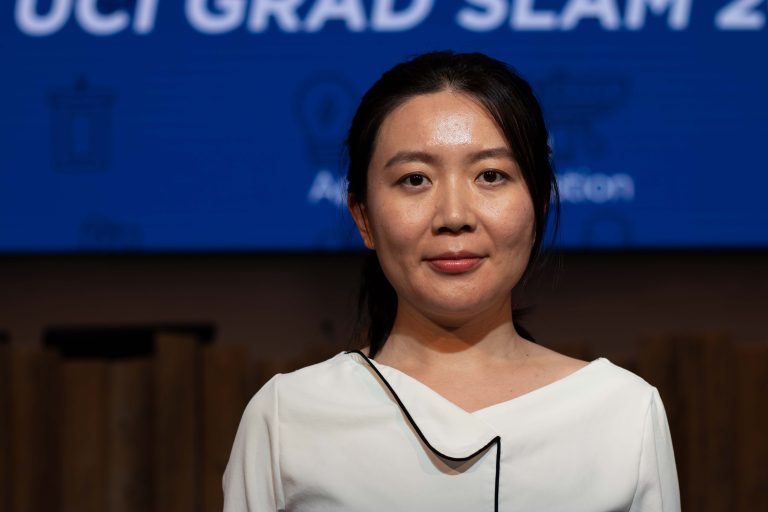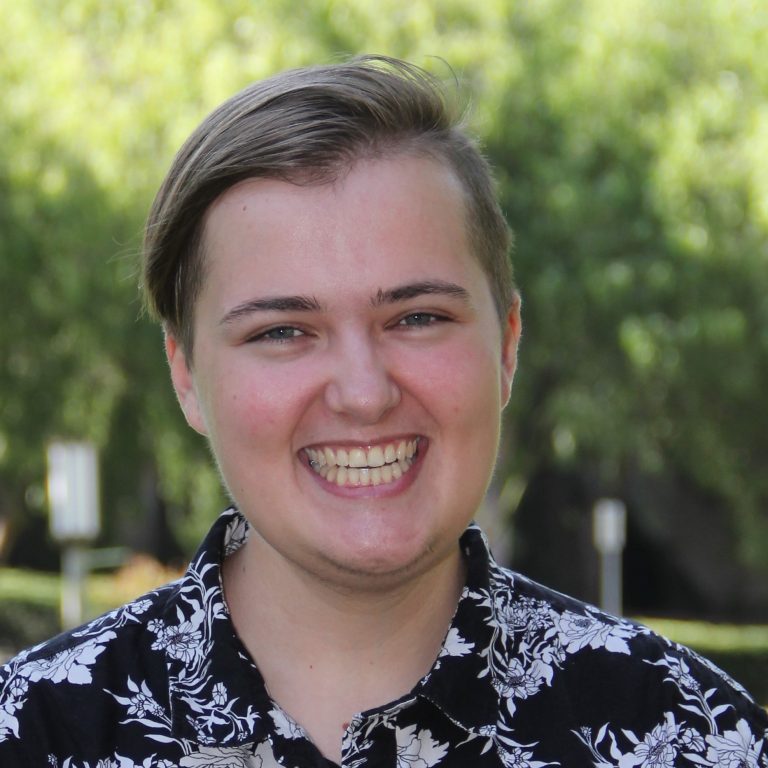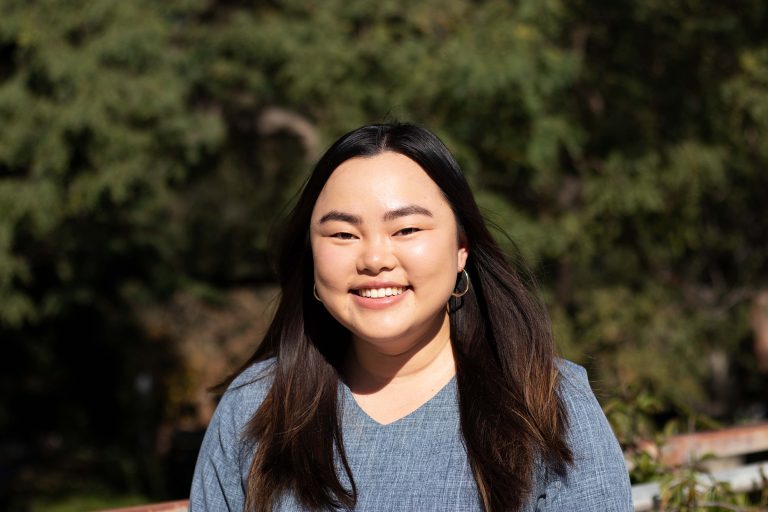Public Impact Fellowship
Public Impact Fellowships highlight and support doctoral or MFA students whose current research has the potential for substantial impact in the public sphere. Ideal candidates will be involved in research designed to significantly improve or enrich the lives of Californians and/or national and global communities.
More information about this fellowship can be found in the Call for Nominations and also on our main funding page located here.

Distinguished Fellows
David Au
Degrees:
- Biomedical Science, University of California, Irvine, Ph.D., 2022 (in progress)
- Biomedical Engineering, University of Utah, BS, 2016
Research:
My work focuses on understanding how insects like flies and mosquitos receive photic inputs to drive specific behaviors, like attraction or avoidance to light.
Biography:
I am a first-generation student in my 5th year of graduate education studying the circadian/visual neural circuits of Drosophila. I entered the Cellular and Molecular Bioscience program and joined the Holmes lab in the Department of Physiology and Biophysics. My work has focused on how circadian photoreceptors, like CRYPTOCHROME, transmit light cues to the neural circuitry driving sleep/wake and light attraction/avoidance behaviors. So far, I have co-authored three manuscripts, with a first-author manuscript currently in submission. I was awarded an NIH NRSA F31-Diversity fellowship for this work, as well as a Stanley Behrens Research Excellence award. Additionally, I am involved with UC Irvine’s diversity, equity, and inclusion efforts. I have been a School of Medicine (SOM) DECADE Representative for four years, having also received an Outstanding DECADE Representative award. I also serve on the SOM Student Advisory Council and am a student recruiter through organizations like the NIH and SACNAS. My research interests and drive for inclusive excellence are imperative for my success as a future independent research scientist.
What this Fellowship/Award Means To Me:
I am honored to have received this fellowship to help strengthen our mosquito-disease vector control efforts on a global scale. These funds will help me travel to conferences and symposia, where I can educate and expose my work to communities to spur networking and collaboration. This fellowship will also support my prototyping efforts for a custom bug-zapper device that will help better control mosquito-borne diseases in struggling areas around the world.
Significance of my research in the public sphere:
Mosquito-borne diseases lead to an annual death count of over one million people worldwide, which is exemplified by the use of pesticides as a means of control because it also poisons waters, crops, and livestock. Light-based control is an increasingly appealing alternative to pesticides because of its relatively low environmental impact and ability to be cheaply produced, distributed, and maintained. I envision a world where countries no longer have to choose between reduced agriculture from poisoned farmlands and communities overwhelmed with disease and death. This is especially prevalent in regions that also suffer under a crushing economy that foots the cost of multi-billion-dollar recovery and prevention efforts.

Dandan Yang
Degrees:
- Education, UC Irvine, PhD, exp. 2022
- Education, UC Irvine, MA, 2019
- TESOL, University of Southern California, MA, 2014
- English Language and Literature, China University of Mining and Tech, BA, 2013
Research:
My research focuses on technology-supported language learning for children from linguistically diverse backgrounds.
Biography:
Dandan Yang is a Ph.D. candidate at the University of California Irvine, School of Education. Prior to joining the Ph.D. program, she gained teaching experience in various school settings in both China and the US. Building upon these experiences, Dandan’s research focuses on using technology to facilitate children’s language and literacy development. In her dissertation project, she built a bilingual interactive storybook to facilitate parent-child dialogic reading and children’s bilingual literacy development. Dandan’s work has been presented at renowned academic conferences, such as the Society of Research in Child Development conference, the American Educational Research Association, and the Society for the Scientific Study of Reading, and peer-reviewed journals, such as Educational Research and Reviews and Assessment for Effective Intervention. Her work has been widely recognized in the research community and the educational technology industry with awards and fellowships including the Duolingo Research Grant, UCI Graduate Dean Dissertation Fellowship, and the International Research Foundation for English Language Education Dissertation Grant.
What this Fellowship/Award Means To Me:
I feel extremely honored to receive the Public Impact Distinguished Fellowship. This award is a recognition of my scholarship and the potential impact of my research to not only the scholastic society, but also to the children and parents from culturally and linguistically diverse backgrounds. The financial support from this fellowship enables me to better focus on my research on children’s bilingual literacy development. Being a public impact distinguished fellow is a great support for my future career in academia and my goal of becoming a faculty member where I will continue to improve educational and social equity for students from disadvantaged backgrounds. It has been a lot of hard work from many people that contributed to this work, and I want to use this opportunity to highlight the support and guidance of my advisors, Prof. Mark Warschauer, Prof. Penelope Collins and Prof. Carol Connor. Without them, this work would not have been possible.
Significance of my research in the public sphere:
Parents should be a vital part of children’s language and literacy learning process, regardless of their own language background. By developing an interactive bilingual storybook app for parent-child share reading and examining the effectiveness of the innovation and its design features, my research has benefitted millions of children from financially disadvantaged and language minority backgrounds, as well as millions of English language learners from less developed countries and areas. As we continue to expand this work on an international scale, we hope to shape the development of low-cost mobile apps that can bridge the gap between home and school education around the world. Our research findings are shedding light on the design, affordances, and educational effectiveness of interactive bilingual e-books as a promising approach in reducing achievement gaps and educational inequality. In addition, this research project has provided research opportunities for over 40 undergraduate and graduate students and yielded over 5 UROP and SURP fellows.

Emory James Edwards
Degrees:
- Informatics, UC Irvine, PhD, 2023 (Expected)
- Informatics, UC Irvine, MS, 2020
- English, University of Washington, BA, 2017
- Informatics, University of Washington, BS, 2017
Research:
Investigating ways that people with disabilities can be represented fairly and be socially / organizationally integrated into technology design
Biography:
As an undergraduate, Emory received a double degree in Informatics (magna cum laude) and English (cum laude with honors), receiving almost $18,000 in scholarships. Under the mentorship of Dr. Stacy Branham, Emory has published three papers and one journal article while taking leading roles on multiple projects including designing a wearable voice assistant for disabled travelers (funded by Toyota) and collaborating with Google to gather diverse user perspectives on how to make more inclusive and accessible imagery for their internal and external products. Now in their 5th year, Emory is working as a research consultant at Intel, pursuing further collaborations with Google, and collecting data for their dissertation proposal.
What this Fellowship/Award Means To Me:
Receiving this award for the work I’ve been doing for the past two years means the world to me. It’s wonderful to feel like the massive amount of work put into this project—by me and by my collaborators, advisor, and co-authors—is being seen and recognized. But it’s about more than just me or even us, it’s about the changing tide in academia and beyond. Inaccessibility is not a peripheral problem that can be fixed by last-minute additions or workarounds. Instead, inclusion and respect for people with disabilities is being acknowledged as a central issue that everyone must be aware of and try to address. From my generous participants helping to create better representations of disability in mainstream technology, to the disabled networks of care that sustain me and this work, receiving this fellowship is a validation. It shows that the time, labor, and needs of people with disabilities are being given the acknowledgement they deserve.
Significance of my research in the public sphere:
2.2 billion people worldwide are blind or have low vision. They access digital images through written summaries, called image descriptions. But more than 30% of images—up to 99% on platforms like Twitter—lack image descriptions. Partnering with Google, I led interviews and focus groups with people with disabilities to co-create a set of 40 images and descriptions that depict a diverse set of users, including people with disabilities. Originally intended as a tool for Google’s 135,000 employees, the images and descriptions are now going to be included on all Google Chromebooks starting November 2021. An estimated 40 million laptops will come for the first time ever with accessible profile images at setup that depict disability. For blind people, this will be the first time that they can know what their laptop’s user profile image looks like and can potentially choose one that has a visible disability, like them. My research is creating a pathway for the voices and images of disabled people to be incorporated into technology development—a critical next step to making technology truly accessible.

Desiree Macchia
Degrees:
- Molecular and Cell Biology, UC Berkeley, BA, May 2016
Research:
I study how the connectivity between brain cells changes throughout Alzheimer’s disease progression.
Biography:
I received my BA from UC Berkeley in 2016. I worked in two labs as an undergraduate research assistant spanning projects from human eye research to behavioral neuroendocrinology. After graduation, I worked as a research technician in the Neurobehavioral Core at the Gladstone Institutes to investigate a variety of behavioral functions in mouse models of diseases and have been able to contribute to multiple publications. Today, I am pursuing my PhD in Dr. Kevin Beier’s lab at UCI, studying the neural circuitry underlying Alzheimer’s disease progression and related disorders. I hope to discover novel targets and therapies for those affected by neurodegenerative disorders through using brain circuit mapping and activity modulation techniques.
What this Fellowship/Award Means To Me:
I am so grateful to have received this award to support my research on Alzheimer’s disease. As I work in a basic neuroscience research laboratory, I can investigate the neural mechanisms underlying disease progression by carrying out experiments in the rodent model, which we are currently unable to do in humans. Research like what is being done in our lab, has proven to be the backbone of biomedical discoveries and I am continually amazed by my peers and their passion to improve the lives of others. Being recognized for this work as having immense public impact, I am encouraged that UCI supports and believes in the work that neuroscientists are doing to help Alzheimer’s disease patients. I am excited to continue working in this field beyond the PhD and know that my contribution is an important step towards discovery of new pharmacotherapies to help the millions affected by the disease.
Significance of my research in the public sphere:
Alzheimer’s disease (AD) is one of the most prevalent forms of dementia and affects approximately 5.8 million Americans today, making it the 6th leading cause of death in the United States. AD is characterized by the presence of protein aggregates and associated behavioral decline. In clinical trials, researchers have been able to successfully target or remove these protein aggregates, yet they were not able to significantly slow AD progression or improve cognitive decline. To reach a curative treatment for AD, researchers employing new hypotheses and approaches to combat the disease. One of these hypotheses is that AD may begin with brain hyperactivity due to overactive neuronal networks. My research aims to identify and target these hyperactive brain circuits and investigate whether they contribute to eventual memory loss and development of the protein aggregates. The results from my work would reveal novel brain circuits that are associated with the earliest detectable changes in AD and thus these cells and circuits can be targeted for therapeutic interventions.
Fellows
- Monica De Roche, Political Science
- Pegah Mottaghizadeh, Mechanical & Aerospace Engineering
- May Hui, Physiology and Biophysics
- Alexandria Jones-Patten, Nursing
- Timothy Hartshorn, Anthropology
- Nicholas Drago, Chemistry
- Hye Rin Lee, Education
- Victoria Rodriguez, Public Health
- Emanuel Preciado, Urban and Environmental Planning and Policy
- Renzhe Yu, Education
